(Family of Franziska Pedersen, Canada)
In the summer of 1954 all seven of us travelled to Germany. Theresa was 16, Barbara was 13, Franziska was 10, Josef was 7, and Tony was 4 years old. It had rained and so we walked barefoot on the dirt road to the train station carrying our sandals and socks with us. When we arrived in Uprava, where we used to attend school, we washed our feet in a puddle and put our sandals on, before getting on the train. We stayed with Brother Jova Ovuka in Belgrade over the weekend and then continued by train towards Germany.
We stopped in Vienna, Austria to see Aunt Helen, our mother’s sister, and her daughter Barbel, our cousin. They had left Yugoslavia before the end of the war. Aunt Helen was employed as a housekeeper with a rich family. They could not believe the way we were dressed—so poorly, but we did the best we could. We stayed several days with them. I remember our Aunt Helen taking us to see a little of Vienna and everything was so beautiful and exciting for us children to see. There was an amusement park and a Ferris wheel. We had never seen anything like it, or the street lights in the city after dark. We then continued by train to Piding, near Bad Reichenhal, not far from Salzburg, in Bavaria, Germany.
In Piding we stayed at a refugee camp where people had come from many different places. We stayed there for several weeks while waiting to be transferred to another camp. In this camp they had a kitchen where they prepared all our food and we, of course, always had to check what the menu was; whether we as vegetarians could eat it. Food was good and most of the time it was not a problem. On Sabbaths, weather permitting, we walked to a nice green area by the river Saalach not too far away from the camp, and worshipped there together with others. While I (Franziska) was writing this part, I remembered the words written by Luke in the book of Acts when Paul and Silas were preaching in Philippi, “And on the Sabbath we went out of the city by a river side, where prayer was wont to be made; and we sat down and spake unto the women which resorted thither.” Acts 16:13
While in Piding a young man from the Reform Church came to see our family—we cannot remember his name. He was a colporteur. This young man was on his way to Speele, our church’s Mission School at that time. Theresa went with him to Speele. There Theresa met Elisabeth Gebhard. This was a young girl, also a refugee, whom our family knew back from Yugoslavia and whose family came to the faith in Knicanin through our Father. While at the Speele Missionary School they were asked to go canvassing once in a while, but Theresa had no decent clothes for this, so a young sister from Holland gave her a coat and some other girls gave her shoes and other clothing items she needed. Theresa did not like it very much at this school and felt that she did not fit in, and after a while she got sick. In the meantime, Father and Mother, with the rest of the family, were transferred to the Hamburg region, about 925 km north of Piding. Theresa wanted to come home, so our parents sent her the money for the train ticket to Hamburg.
Our parents were told that in order to go overseas—which our Father had in mind—we had to go to Hamburg-Finkenwerder. Father did not wish to stay in Germany because he did not want our brothers Josef and Tony to have to contend with being called into the military service when old enough. So he was advised to go to Hamburg-Finkenwerder and apply to emigrate from there. Hamburg was a large city with the River Elbe on the East side and a smaller city, Finkenwerder on the West side of the Elbe. Here we were again placed in a refugee camp in Finkenwerder. The camp had been an airport that the army/navy used during Hitler’s time. There were several large brick barracks in this camp. We were nine people to a room. There were two bathrooms in the building, one for men and one for women, plus a room with a bathtub for the whole building. There were approximately 18 rooms. Those old enough to work got jobs in either Hamburg or Finkenwerder. The church and the Red Cross both brought some clothes for the refugees so all could dress a little better. Some of the wives of the refugees were Yugoslavian and did not speak German and neither did their children, so those who were not working and were interested to learn, took German classes. Everyone in our family could speak, read and write German. Only Tony had to learn how to read and write, as he was not quite 5 years old. Back in Yugoslavia, we used to read the German Bible and of course speak German in our home—that was our mother tongue. That was the first time that Mother did not look for a job. She could stay at home.
After being in this camp for a little while our two cousins Bernhard Dittrich age 18 and his brother Michael age 15, our mother’s brother’s sons, arrived from Yugoslavia. They moved in with us. We had bunk beds, so it was not too bad; we made it work.
The first year Theresa got a job at Franziska’s teacher’s parent’s house as a maid. The father was a Director at the Deutsche Schiffbau in Hamburg. That was a place where they built ships. They had two daughters. One was a teacher and the younger one was attending college away from home. The one at home did not think it was good for Franziska’s 16-year-old sister to live in a room with eight other people, so she asked her mother to let Theresa stay with them while working for them; she then got to use Otie’s bedroom. Barbara took the ferry every morning over the River Elbe and then hopped on a streetcar in Hamburg which took her to the shop where she was learning to become a seamstress. Our Father got work at the shipyard at the River Elbe unloading ships.
Josef and Franziska went to school in the camp for a little while and when their German writing had improved they were transferred to the regular school in Finkenwerder. While in this camp, Franziska, Josef, Tony, Nick Sattelmayer and several other children got the measles and had to stay in a medical building in quarantine for some time where the parents had to bring them their meals every day.
While we were in Finkenwerder we met Sister Leila Marttinen (McTavish) for the first time. She and her friend Vuokko, from Speele who were doing canvassing work in Hamburg came to visit us. After a while, some of August Sattelmayer’s family, also refugees from Yugoslavia arrived at the camp in Finkenwerder. They all got work in Hamburg at Herr Meuter’s calculator factory, where Theresa also worked later on until we left for Canada.
After arriving in Hamburg/Finkenwerder our Father had contacted the Reform Church here in Ontario, Canada, where he was put in touch with Brother Korpman. Brother Korpman was so kind to find a farmer in Niagara-On-The-Lake who guaranteed to give our parents work on his cherry farm when we arrived; this was required by immigration in order to get a Visa so that our family could come here. Our Father would turn 47 years old later that year.
So, in the summer of 1956 with our Visa for Canada and a job lined up for our parents, we took a train to Bremer Hafen which is about 180 km straight north of Hamburg; here we boarded an ocean liner called Castle Felice and were on that ship for ten days. Our cabin was quite low down by the water level in the ocean; we always got sea-sick when in the cabin except when sleeping. So we spent most of our time on deck. There we could handle the wind and the turbulence much better. The ship docked in Quebec City where we then took a train to St. Catharines, Ontario. Brother Hans Baer, who lived in Niagara-on-the-Lake, picked us up at the train station and took us to Sister Unrau’s house in St. Catharines on that Friday where we also slept that night. We spent Sabbath at Sister Unrau’s house where we had the Sabbath Service. Sister Unrau was Br. Baer’s mother-in-law. Hans and Erika Baer had two children, Johnny and Lory. Lory was just a baby and Johnny was 4 years old. After sundown on Sabbath, Br. Baer took us all to the cherry farmer, Mr. Wilms, who had sent my parents the guarantee for work for our visa. He was not ready for us. On his property was a small house in very tall grass and weeds that was waiting for us. There were some mattresses and old metal beds.
Tony, Josef and Franziska attended a country school down the road where they had several classes in one room. We were very disappointed with where we had to live. It was hard at the beginning, not knowing the language, but we kept on trying and were learning something every day. Mom and Dad picked cherries and whatever other fruit needed picking as the summer progressed.
Ruth Milchenko, a German young lady from church and her husband Karl, living in Niagara-on-The-Lake, found work for Barbara and Theresa with two families in St. Catharines as housekeepers. Theresa worked for a Jewish family—a husband and wife with their married daughter and son-in-law. They owned a taxi company. Barbara was on the same street employed as a housekeeper with a family that had a couple of younger children and a baby.
One Friday evening, not too long after getting the jobs, Ed Unger, who was engaged to Hulda Goertz in Kitchener came to see our family. He drove every Sabbath to Kitchener to visit Hulda and one day he brought her along to visit us. About two months later, Barbara and Theresa moved to Kitchener. Hulda’s cousin Erika Friesen got them a job at a sweater factory in Waterloo. Their pay was 55 cents an hour. They rented a one-room place and took the trolley to work every day.
When there was no more work available for Mother and Father on the farm in Niagara-On-The-Lake, they, and Franziska, Joe and Tony moved to Kitchener.
While we lived in Kitchener we became friends with the Goertz, Friesen and Reimer Families and worshipped together each Sabbath. Since Father had no profession and could not speak English, finding work in Kitchener was very difficult, and so after a while we all moved to Toronto.
Now, the Polzer family had five children and no one wanted to rent an apartment to us even though the oldest child was Theresa, who was at that time 20 years old, Barbara was 17 and they were both working. Everyone said, “Sorry, we don’t like a family with five kids.” But finally we found an apartment on the second floor of a pretty old house on Seaton Street in the East end of Toronto.
When we turned the lights on in the kitchen and when we opened the kitchen cupboards on Seaton Street, the cockroaches scurried into hiding. After living on Seaton Street for a while, our Dad bought a three-storey house at 340 Delaware Avenue a couple of blocks north of Bloor Street and a little East of High Park. Here we were able to rent out the second and third floors while we used the main floor and the basement.
Peter Sattelmayer whom we had met at the camp in Finkenwerder, Germany also came to Toronto in 1956. He got Father a job with him unloading lumber out of boxcars at the railroad station. Mother was cleaning houses and Franziska, Joe, and Tony attended school. Barbara and Theresa worked at a men’s hosiery factory called McGregor Hosiery Mills. Ruth Milchenko’s sister Hildegard also worked there. It was not a bad job. They travelled by streetcar all the way down Bloor Street to Spadina Avenue.
After moving to Toronto we got to know Brother Timo Marttinen and his brother Leo with his wife Ira, and his brother Taimo and his wife Eira and family. We also befriended Brother and Sister Korpman, family Karhinen, Sister Liske and her mother, Ernst Hofer, Siegfried, Brother and Sister Moore, their son David and in time the Family Radin, the Koledin family and many more.
While we lived at 340 Delaware Avenue, Brother Timo also purchased a house on Delaware Avenue only a few blocks north of our house. A while later his Sister Leila came from Finland and moved in with him. Then Sister Rose Incze, whom we called Rosly also came and lived there, as well as our sister Theresa with her husband Peter Sattelmayer.
One of the things I fondly remember is when we spent time together during the Christmas holidays on the weekend in 1958. We all came together at Brother Timo’s house on Delaware Avenue to attend Bible classes with Brother M.P. Ringelberg.
Now many years have gone by since we experienced the above and we have all grown older and things have changed. Our parents have since passed away and
some of us five Polzer children are now in our seventies and others in their eighties. We thank the Lord for all His love and care for our family throughout the years until today.
We are so happy and grateful that our Father found the truth and became an Adventist before the Second World War. Both our uncles and our grandfather lost their lives and most likely our Father would not have survived, if he had not known the truth and refused to join the army. It definitely is a miracle that our whole family survived this terrible time during and after the War.
We pray that our family, and our church family here and everywhere, may remain faithful and be a blessing for others in our lives and prepare for Jesus’ soon coming in the clouds of heaven so that when He comes we will be ready to go with Him to the home He is preparing for all who love Him. Amen.
Compiled by: Franziska S. Pedersen
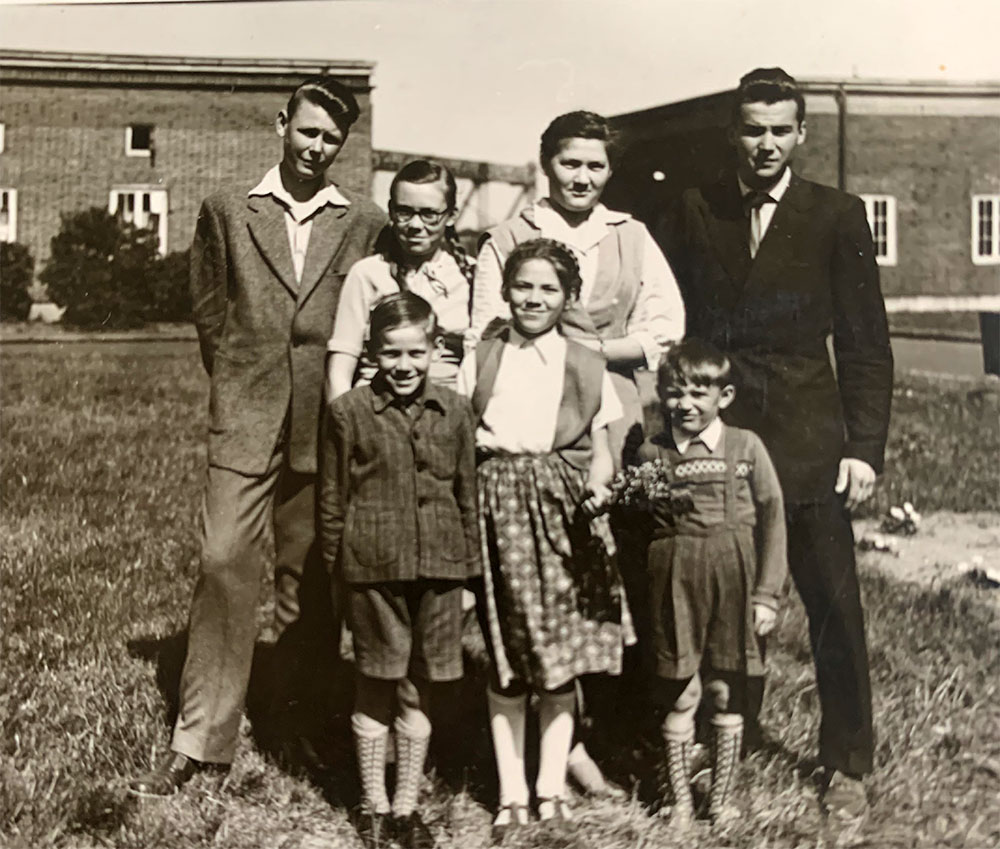
June 1955
Finkenwerder, Germany Refugee Camp.
Left Back: Michael and Bernhard (our cousins), with Barbara, Theresa,
Front: Josef, Franziska and Tony
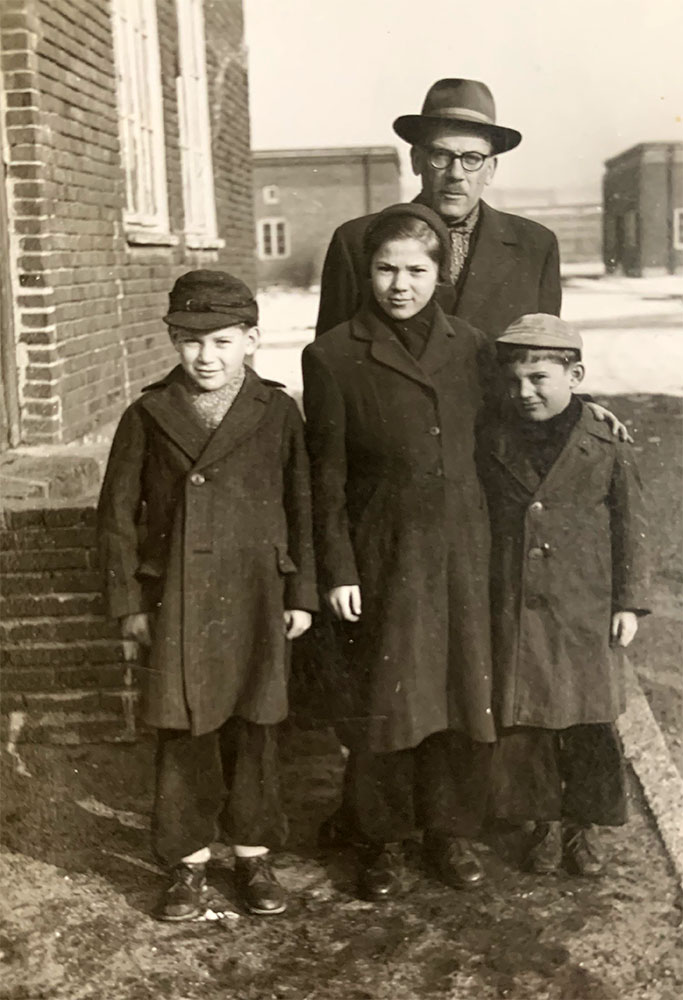
1954/1955
Father, with Josef (on left), Franziska and Tony
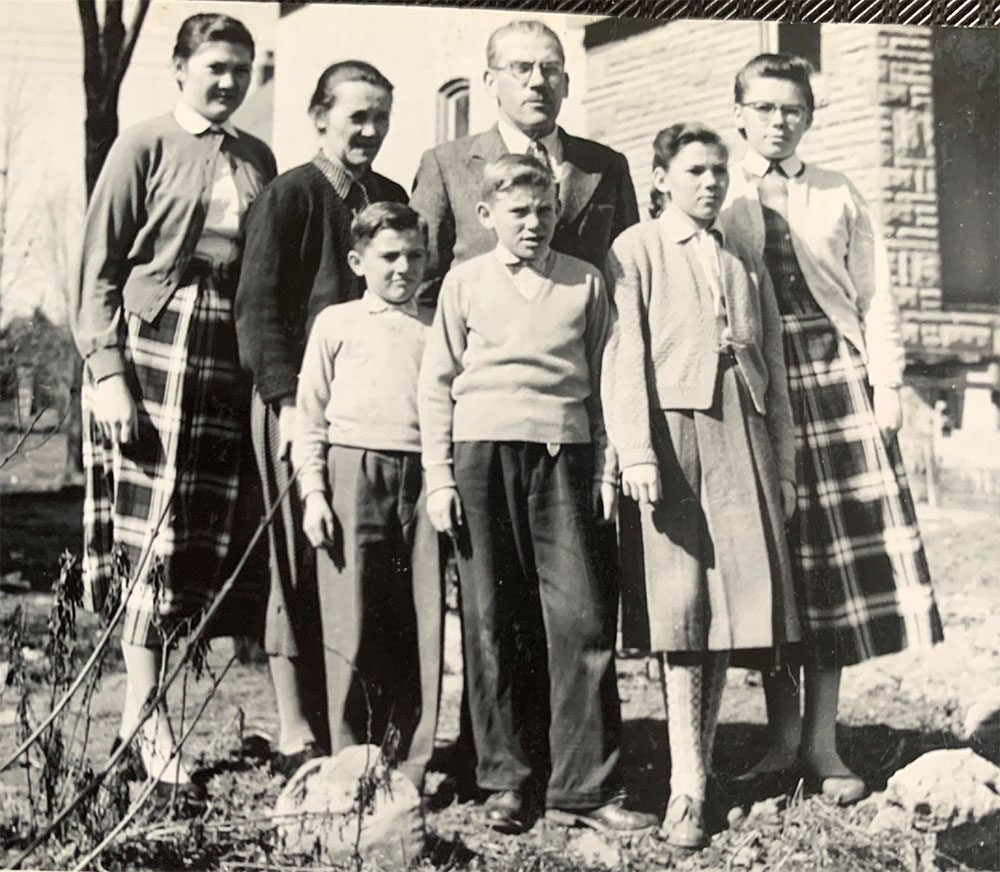
1957
The Polzer family on Wilhem Street, Kitchener
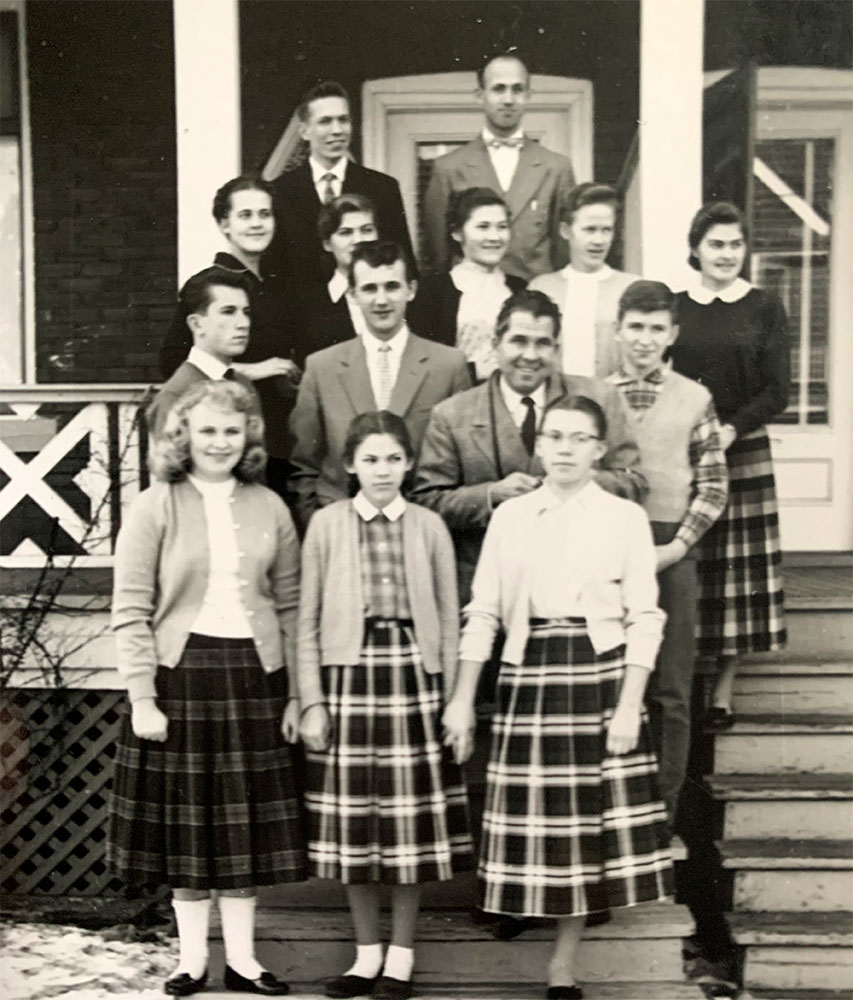
1958
Outside Brother Timo’s house on Delaware Avenue
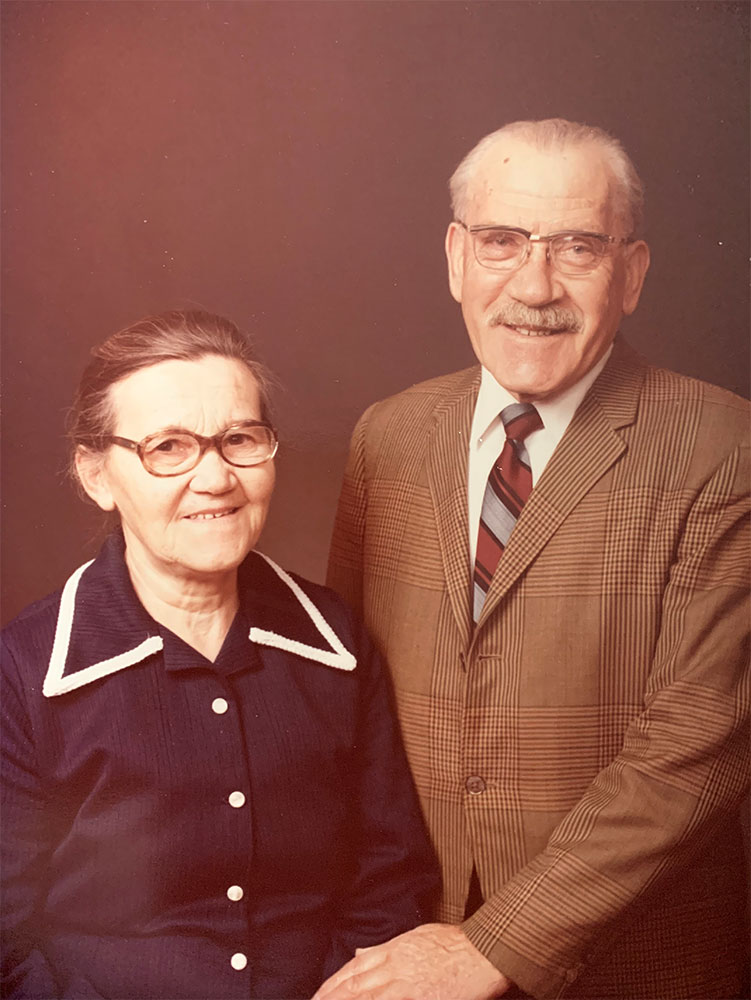
April 1979
Mother 67 years old, Father 70 years old
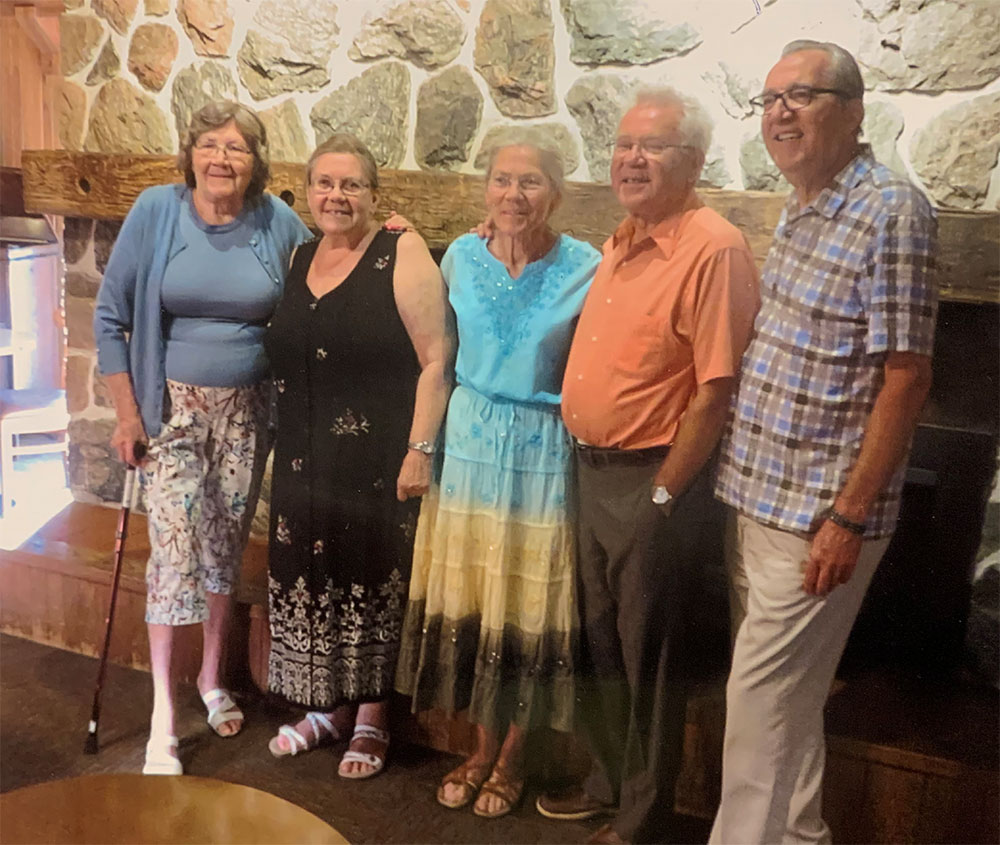
July 2019
From Left: Teresa, Barbara, Franziska,
Josef, Tony
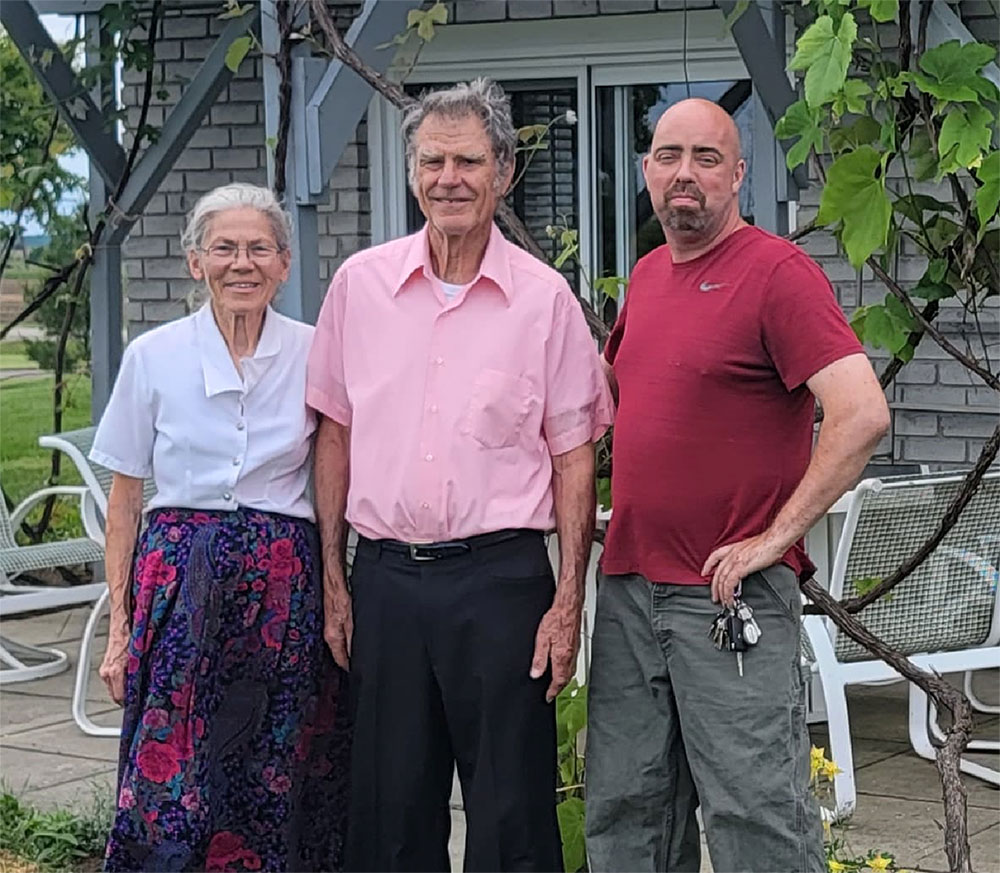
Franziska married Evald Pedersen in 1969. He is originally from Denmark and after living in Denmark for four years and one year in Norway, they came to live in Canada.
They currently attend the church in Hamilton, Ontario, where Brother Evald serves as the church leader and Elder.
They are pictured here with their son, Paul
